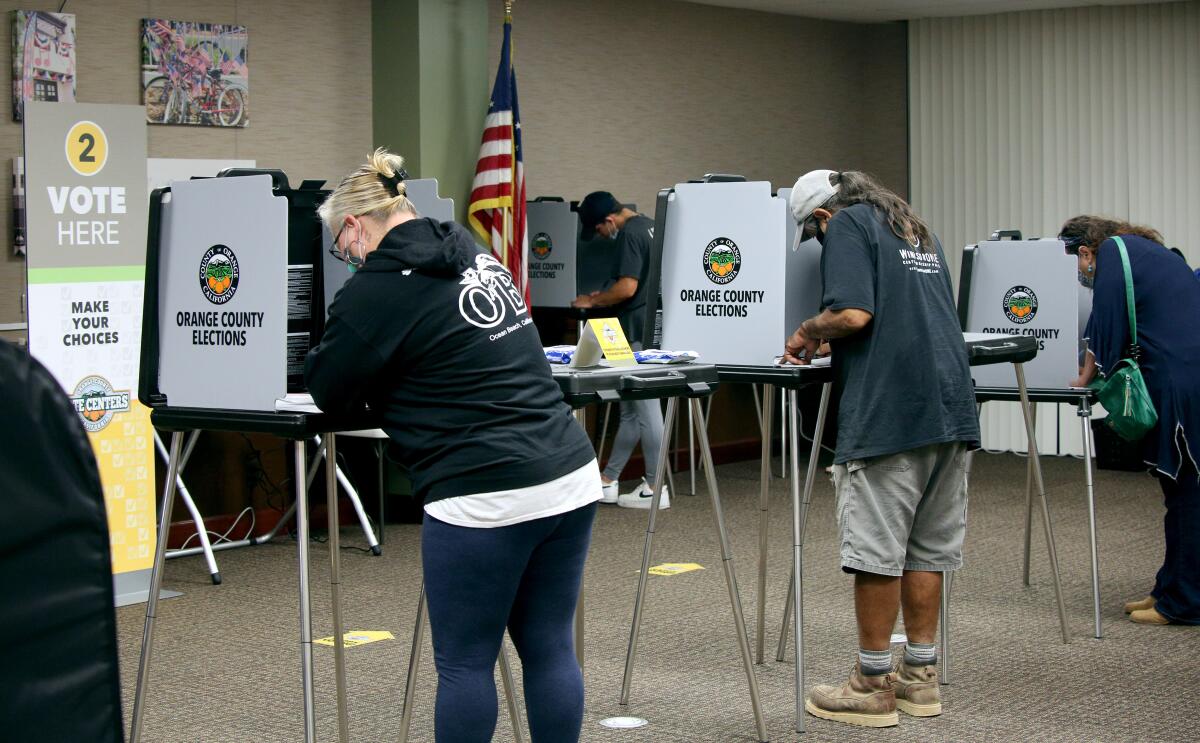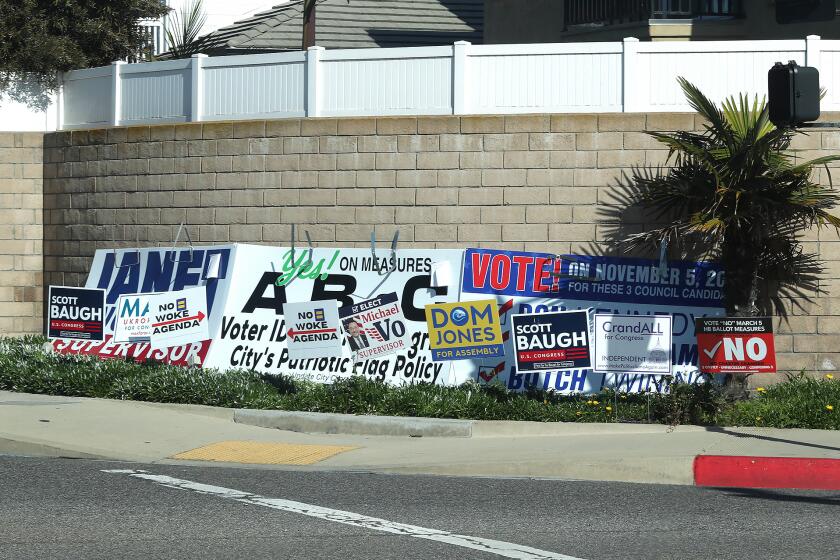As Huntington Beach decides whether to require voter IDs, state officials mount offensive

- Share via
As Huntington Beach residents begin mailing in their ballots for the March 5 primary, state officials are mounting an offensive against one Surf City initiative and have introduced legislation to nullify it and others like it.
Measure A would require voters to provide photo identification at polling places, allow for the placement of at least 20 additional ballot boxes in town and authorize the city to monitor ballot drop boxes to ensure compliance. If implemented, it could take effect in 2026.
“It is crucial for our democracy that voters have faith in our election results,” reads a ballot argument, prepared by Mayor Gracey Van Der Mark and Councilman Tony Strickland. “That trust in the outcome of elections comes into question when we can’t always be certain who is voting.”
But while some see the initiative as a step toward exercising local control and deterring voter fraud, others claim it conflicts with state laws and would only serve to suppress voter participation without providing a real local benefit.
Sen. Dave Min (D-Irvine) on Wednesday introduced Senate Bill 1174, which would prohibit any local or municipal government in California from enacting or enforcing laws requiring voters to present an ID in order to cast a ballot. If passed, it would be applied beginning Jan. 1, 2025, and effectively supersede Measure A.
Min said he was inspired to craft legislation that would serve as a final word for any municipalities considering drafting their own ordinances or ballot initiatives to change election day procedures.
“I’ve heard rumors other cities are looking closely at Huntington Beach to see what happens,” he said in an interview Thursday.
“If voter identification was a real problem, I’d agree the state should act. But in California, we have not seen any legitimate reports of voter fraud, and certainly not in Orange County,” he continued. “It should be up to the state of California to decide a universal set of voter identification laws — local cities should not be able to make their own rules here and there. That’s what this bill is about.”
A former law professor at UC Irvine, Min said studies indicate identification requirements and ballot box monitoring can have a “chilling effect” on people of color, young voters and seniors. Other citizens who are eligible to vote may not have a government issued photo ID.
“In a democracy we should be doing everything we can to make it easy for people to vote,” he added.
In a Sept. 28 letter sent by California Atty. Gen. Rob Bonta and Secretary of State Shirley Weber to members of the Huntington Beach City Council, the state officials warned the implementation of Measure A would directly conflict with state voter laws and compel action.
Measures A, B and C would mean changes in the city including the requirement of voter identification for in-person voting.
They explained that while the text of Measure A gives city leaders control over municipal elections, it is unclear whether or how any actions taken could affect elections in which city-level matters are consolidated with state and federal ballots.
State laws already require people to provide identification when they register to vote and impose penalties for those to attempt to fraudulently register. Further, election code sets forth specific parameters limiting what kinds of information poll workers may seek from the voting public.
“By requiring additional documentation to establish a voter’s identity and eligibility to vote at the time of voting — a higher standard of proof than set out in the Elections Code — Huntington Beach’s proposal conflicts with state law. Indeed, the City’s proposal would arguably constitute ‘mass, indiscriminate, and groundless challenging of voters,’ in violation of Elections Code section 18543,” they wrote.
“If the city moves forward and places it on the ballot, we stand ready to take appropriate action to ensure that voters’ rights are protected, and state election laws are enforced.”
Min said while the attorney general’s office is convinced of the illegality of such local laws, whether or not they directly impact state and federal elections, he wasn’t so sure.
“My read on this is, it’s not clear as a matter of law and, therefore, let’s make it clear,” he said Thursday.
All the latest on Orange County from Orange County.
Get our free TimesOC newsletter.
You may occasionally receive promotional content from the Daily Pilot.








